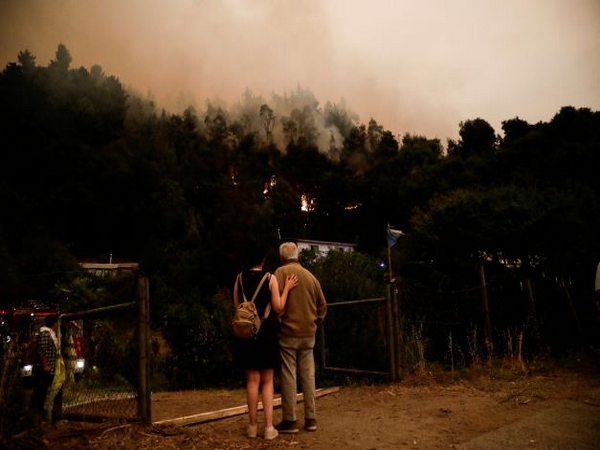

At least 13 persons were killed on Friday, authorities said and 14,000 hectares of land were torched as dozens of wildfires raged in Chile amid the summer heatwave in the country, reported CBC News.
Eleven people, including a firefighter, had died in the town of Santa Juana in Biobio, a region some 310 miles (500 km) south of the capital Santiago, local authorities said.
The minister of agriculture also reported an emergency-support helicopter in the southern region of La Araucania had crashed, killing the pilot and a mechanic.
Many of the fires are concentrated in the Biobio region, located about 560 kilometres (348 miles) south of the capital city of Santiago, reported Al Jazeera.
State of a catastrophe has been declared in the farming and forest areas of Biobio and neighbouring Nuble, prompting the deployment of soldiers and additional resources, reported CBC News.
Hundreds of homes have been damaged while 39 fires rage across the country, Interior Minister Carolina Toha said.
“The conditions in the coming days are going to be risky,” Toha told journalists.
She said ground equipment and a fleet of 63 available planes were reinforcing the firefight, with help from Brazil and Argentina expected.
Chilean President Gabriel Boric on Friday cut his summer vacation short and travelled to Nuble and Biobio, which together have a population of nearly 2 million people, reported CBC News.
“My role as president today is to ensure that all resources will be available for the emergency and so that people feel that they are not going to be alone,” Boric said from Biobio.
He also pointed to “signs” that some fires may have been started intentionally.
On Friday, weather forecasts predicted temperatures of more than 38 degrees Celsius (100 degrees Fahrenheit) in Nuble’s capital of Chillan.
Hundreds of homes have reportedly been damaged or destroyed, but the exact number remains uncertain.
Some families sought refuge in shelters, according to the Chilean disaster agency Senapred. Fires disrupted traffic on highways, and numerous settlements have been evacuated.
Partly due to climate change, wildfires have grown in scope, intensity and frequency as rising temperatures and drought heighten fire conditions around the world, resulting in explosive blazes in places like Chile, Algeria, France, Spain and the western United States.
In late December, a forest fire near the coastal resort town of Vinas Del Mar in Chile killed at least one person and destroyed more than 100 homes.